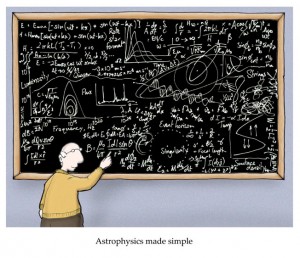Last week I was a rather noisy fly on the wall in a workshop run by Sara Shinton to help post-docs prepare for fellowship interviews. Sara pointed out that many institutions, including Glasgow University, which is where the workshop took place, have developed extensive support programmes for would-be fellows and will arrange a mock interview if you give them sufficient notice.
We also worked out a simple 10 minute exercise you can do to set yourself up to perform well in the interview. The key, if, like me, you have a tendency to be nervous, is to prepare and to learn a really good answer to a question that almost always crops up at the start of the interview. The question is very simple: Could you tell the committee a little bit about your project. Preparing a good answer to this question is a bit more difficult, but the exercise helps a great deal.
It is best to work with a colleague, someone who is preparing for an interview or writing a project grant themselves is ideal. It’s best if you don’t know too much about their research. The exercise is very simple. Spend exactly 4 minutes asking your friend about their project – you need to find out
- What will the project try to achieve?
- Why would that achievement be important?
- How will the project try to achieve it?
- Why is your colleague a good person to lead the project?
At the end of 4 minutes switch roles so that your colleague questions you about your project. Then you both write one sentence about each project. Spend 1 minute on the sentence and try to give a simple overall statement of what the project will achieve, ideally you will relate that achievement to a big important problem and will also include something distinctive about how the project will achieve it in a way that will make it clear that the PI is a suitable person to do the project.
The sentence you need is something like key sentence 1. You probably want the language to be a bit less formal than you would write in an application because you want to speak it. An ideal sentence would have a structure like this one:- “I’m going to identify potential treatments for stroke by testing compounds that we have found to inhibit brain metabolism in tissue culture”. It does 3 things.
- It says that you are working towards something pretty important, a treatment for stroke. It makes it clear that you don’t expect to get there by saying ‘potential‘. Everyone knows that the road from ‘potential treatment’ to ‘treatment’ can be a long one.
- It uses the phrase ‘we have found’ which says that you are working with compounds that you have worked with before. This establishes that you have credentials to do the work.
- It says that you are going to be testing metabolic inhibitors in tissue culture, which gives a sense of the kind of research you will be doing and the kind of drug that might be developed as a result.
The ideal sentence will have about 30 words. The example I have given has 23. We discovered that some of the workshop participants can write very long and very complex sentences in a minute. We also found that it’s often easier to write a good and convincing sentence about someone else’s project than about your own. Often you can make a really strong sentence by combining phrases from your sentence with phrases from a sentence produced by someone who knows much less than you do about the technicalities.

